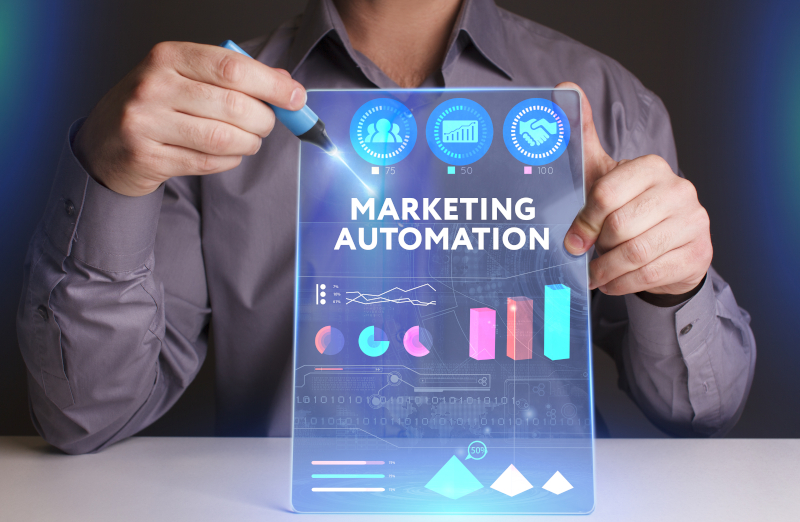Marketing automation är en kraftfull teknik som blivit alltmer populär inom digital marknadsföring. Genom att automatisera olika marknadsföringsprocesser kan företag effektivisera sina arbetsflöden, förbättra kundupplevelsen och driva ökad intäktstillväxt. I den här bloggposten kommer vi att diskutera grunderna i marketing automation, dess nyckelkomponenter, fördelar, utmaningar och bästa praxis för lyckad implementering.
Introduktion
Marketing automation är användningen av programvara och teknik för att automatisera olika marknadsföringsuppgifter och arbetsflöden. Dessa uppgifter kan inkludera e-postmarknadsföring, ledgenerering och -hantering, sociala medier-hantering, analys och rapportering samt kundsegmentering och personalisering. Syftet med marketing automation är att förbättra marknadsföringseffektiviteten och effektiviteten, förbättra kundupplevelsen och driva ökad intäktstillväxt.
Komponenter för marketing automation
Marketing automation består av flera nyckelkomponenter, där varje komponent spelar en avgörande roll för att uppnå dess mål. Några av dessa komponenter inkluderar:
E-postmarknadsföring
E-postmarknadsföring är en av de viktigaste komponenterna i marketing automation. Det innebär att skapa riktade e-postkampanjer för att vårda potentiella kunder, skicka erbjudanden och hålla kunder engagerade. Marketing automations-system möjliggör för företag att skapa personliga e-postkampanjer som utlöses baserat på specifika kundbeteenden, såsom webbplatsbesök, e-postöppningar och klick.
Ledgenerering och -hantering
Ledgenerering är processen att identifiera potentiella kunder och vårda dem tills de blir betalande kunder. Marketing automation hjälper företag att fånga och hantera leads effektivt genom leadscoring, lead-nurturing och leadsegmentering.
Sociala medier-hantering
Sociala medier-hantering är en annan avgörande komponent i marketing automation. Med Marketing automations-system kan företag schemalägga sociala medieinlägg, övervaka sociala medieaktiviteter och spåra sociala mediemätvärden.
Analys och rapportering
Analys och rapportering hjälper företag att spåra prestandan för sina marknadsföringskampanjer och identifiera områden för förbättring. Marketing automations-system ger värdefulla insikter om kundbeteende, konverteringsfrekvenser, e-postöppningsfrekvenser och andra viktiga mätvärden.
Kundsegmentering och personalisering
Kundsegmentering och personalisering gör det möjligt för företag att skapa
mer relevanta och riktade marknadsföringskampanjer genom att segmentera sin kundbas efter olika faktorer som arbetsroll, intressen och tidigare köp. Ett marketing automations-system gör det möjligt för företag att skapa skräddarsydda och personliga kampanjer som är anpassade efter varje segment.

Fördelar med marketing automation
Marketing automation har flera fördelar för företag som vill effektivisera sina marknadsföringsprocesser och förbättra kundupplevelsen. Några av fördelarna inkluderar:
Effektivare och skalbar marknadsföring
Marketing automation gör det möjligt för företag att automatisera olika marknadsföringsprocesser och uppgifter, vilket sparar tid och resurser. Det möjliggör också skalbar marknadsföring som kan hantera stora volymer av kunder och leads.
Ökad intäktstillväxt
Marketing automation kan bidra till ökad intäktstillväxt genom att hjälpa företag att generera fler leads, konvertera fler kunder och förbättra kundlojaliteten.
Förbättrad kundupplevelse
Marketing automation möjliggör för företag att skapa personliga och relevanta marknadsföringskampanjer som resoneras med varje kundsegment. Det leder till en förbättrad kundupplevelse och ökad kundlojalitet.
Utmaningar med marketing automation
Trots dess fördelar har marketing automation också några utmaningar som företag måste hantera för att implementera det effektivt. Några av dessa utmaningar inkluderar:
Komplexitet
Marketing automation kan vara en komplex teknik som kräver en betydande inlärningskurva. Företag måste investera tid och resurser för att förstå tekniken och dess funktioner.
Datakvalitet
Marketing automation bygger på korrekta och relevanta data för att leverera effektiva kampanjer. Företag måste säkerställa att deras datakällor är pålitliga och uppdaterade.
Kostnad
Marketing automation kan vara en dyr teknik, särskilt för mindre företag med begränsade resurser. Företag måste noggrant överväga kostnaderna för marketing automation och dess potentiella avkastning på investeringen.

Bästa praxis för marketing automation
För att implementera marketing automation effektivt och maximera dess fördelar bör företag följa några bästa praxis:
Definiera tydliga mål och mätvärden
Företag måste ha tydliga och mätbara mål för sina marketing automationskampanjer. De måste också definiera nyckeltal (KPI) för att spåra och mäta framgång.
Utveckla en strategi för innehåll och segmentering
Företag bör utveckla en strategi för innehåll och segmentering baserat på kunddata och beteenden. De bör skapa skräddarsydda och relevanta kampanjer för varje kundsegment baserat på deras intressen, behov och beteenden.
Implementera integrerade system och processer
Marketing automation kan kräva integrerade system och processer som kan hantera och övervaka kampanjer och kunddata. Företag bör investera i teknik och programvara som kan integreras med befintliga system och verktyg.
Använd A/B-testning och optimering
Företag bör använda A/B-testning och optimering för att kontinuerligt förbättra och anpassa sina kampanjer. De bör testa olika kampanjer, budskap och erbjudanden för att se vad som fungerar bäst och använda dessa insikter för att optimera sina framtida kampanjer.
Utbilda och träna teamet
Företag måste utbilda och träna sitt team för att säkerställa att de förstår tekniken och hur man använder den. De bör också ha en plan för att hantera och lösa problem som kan uppstå under implementeringsprocessen.
Slutsats
Marketing automation är en kraftfull teknik som kan effektivisera marknadsföringsprocesser, öka intäkterna och förbättra kundupplevelsen. Trots dess fördelar kräver det noggrann planering, investeringar i teknik och resurser och kontinuerlig optimering för att implementeras effektivt. Företag som implementerar marketing automation på rätt sätt kan dra nytta av dess fördelar och skilja sig från sina konkurrenter på en allt mer konkurrensutsatt marknad.

